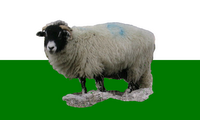
Tuesday, September 26, 2006
The Daily Hump: The Welsh and Their Nuts
 Yes, today we're humping the Welsh. I know, England has been humping the Welsh since Eddie I defeated Llywelyn ap Gruffudd in 1282. And, unfortunately, we're not humping Catherine Zeta Jones, nor even Anthony Hopkins; just the Welsh en masse. Let's get the ball rolling with some good ol' fashioned jokes directed at everyone's second favorite group of Celts.
Yes, today we're humping the Welsh. I know, England has been humping the Welsh since Eddie I defeated Llywelyn ap Gruffudd in 1282. And, unfortunately, we're not humping Catherine Zeta Jones, nor even Anthony Hopkins; just the Welsh en masse. Let's get the ball rolling with some good ol' fashioned jokes directed at everyone's second favorite group of Celts.Q: What do you call a sheep tied to a fence in Wales?
A: A leisure center.
Q. What do you call a Welshman with many girlfriends?
A. A Shepherd.
Q. Did you hear that Welsh people have discovered a new use for sheep?
A. Wool.
Per the Wikipedia (I'm feeling lazy today):
The English name for Wales originates from the Germanic word Walha, meaning "stranger" or "foreigner", probably derived from the name Volcae (a powerful 2nd century BC nation of Gaul). As the Celts of Gaul were Romanized, the word changed its meaning to "Romanic people", as is still apparent in the name of the Walloons of Belgium, Wallachia in Romania, as well as the "-wall" of Cornwall. The Welsh themselves called themselves Cymry, "compatriots", and named their country Cymru, which is thought to have meant "Land of the Compatriots" in Old Welsh; this has reference to their awareness that they were the original countrymen of Wales, and indeed Britain by virtue of their ancestors the Brythoniaid (Brythons), and also in order to distinguish themselves from the foreign invaders of Britain, the Saeson (English)...
 The Welsh are nuts. Well, actually, they're walnuts. Okay, that's not really true either, but walnut comes from the Old English word wealhhnutu. The first element, wealh, is the Old English equivalent to the Germanic word Walha, which, as you read above is responsible for our English word Wales and meant "foreign" (no surprise, but the second element, hnutu, is "nut"). Both wealh and Walha have the same Old Teutonic root, *wal{chi}o-z. These foreign nuts (that is, walnuts, not the Welsh) were called wealh because they were from the Roman lands of Italy and Gaul and needed to be distinguished from the native hazelnut.
The Welsh are nuts. Well, actually, they're walnuts. Okay, that's not really true either, but walnut comes from the Old English word wealhhnutu. The first element, wealh, is the Old English equivalent to the Germanic word Walha, which, as you read above is responsible for our English word Wales and meant "foreign" (no surprise, but the second element, hnutu, is "nut"). Both wealh and Walha have the same Old Teutonic root, *wal{chi}o-z. These foreign nuts (that is, walnuts, not the Welsh) were called wealh because they were from the Roman lands of Italy and Gaul and needed to be distinguished from the native hazelnut. Before we conclude, I should mention there's a verb welsh, meaning to swindle a person by not paying a debt or wager. Or, in a more general sense, to welsh someone is to not fulfill an obligation. The origin of this sense is unknown.
*Requisite disclosure: I spent about 6 weeks working near Eglwyswrw during the summer of '98 and had a great time.
UPDATE: Welshnut is Dorset slang for walnut. [Probert]
Jokes about the Welsh [Celtic.info]
Wales [Wikipedia]
walnut [OED]
welsh [American Heritage Dictionary]
Labels: Old English, Proto-Germanic, The Daily Hump, Welsh Gaelic
:: posted by David, 8:13 AM